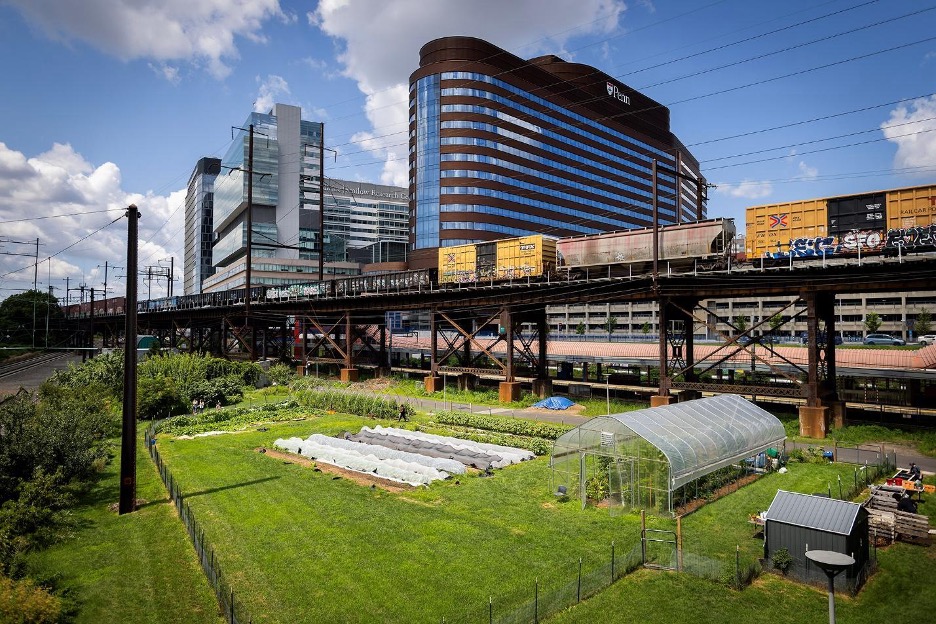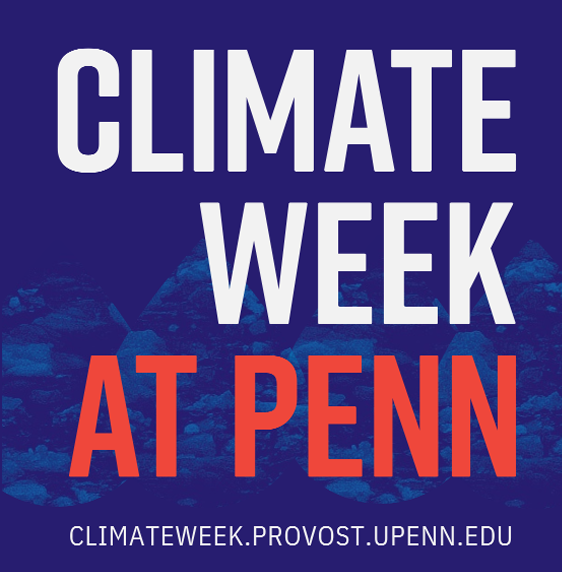Penn Farm: Climate-Smart Agriculture in Action
By Marie Dillard

Picture this: a farm, lush and full of color, with buzzing bees, beautiful butterflies, and diverse crops, nestled between three train tracks, a river, and a busy city bridge—a true oasis amongst the city’s commotion. This is Penn Farm, a Wellbeing Initiative of Wellness at Penn, located right on campus in Penn Park across from the Penn Medicine Station.
Penn Farm is a regenerative farm using climate-smart farming practices to restore the environment and improve soil health. Some ways we do this are by intercropping (planting more than one plant variety within the same bed), making our own compost, avoiding chemical herbicides and pesticides, utilizing cover crops, and not tilling our beds. These practices are very important for preserving and revitalizing the land we have.
In the U.S., conventional agriculture looks very different from this regenerative approach: vast plots with one crop, massive industrial tractors and combines churning the soil, and frequent spraying of chemical herbicides and pesticides. These are not just different farming methods—they come with serious environmental consequences.
For instance, monocropping (the practice of growing a single crop in a large area) depletes the soil of organic matter and nutrients and leaves farms more vulnerable to having entire crops wiped out by pests and diseases. Unlike intercropping, which helps reduce erosion through diverse root systems, monocropping makes the land more susceptible to erosion and long-term degradation. The vast use of pesticides and herbicides compounds the problem by disrupting the soil’s complex ecosystem, killing beneficial microorganisms that crops depend on. Even tillage, the act of breaking up and turning over soil using mechanical equipment, often thought to be beneficial for aerating soil, can accelerate erosion, strip the soil of critical nutrients, and release carbon into the atmosphere.
According to the USDA, agriculture accounts for approximately 10.6% of U.S. greenhouse gas emissions, with a large part coming from the use of synthetic fertilizers and clearing forests to make space for farms. When we look at our food system as a whole, we can also see that emissions from transportation—getting food to the people—also plays a major role in agricultural greenhouse gas emissions. Penn Farm is an example of how we can reshape our food system, reducing its carbon footprint and improving our local environment. Penn Farm’s distribution model is hyper-local, with all the produce we harvest getting distributed right here on campus! This enables transportation emissions associated with Penn Farm’s food distribution to remain very low, especially when compared to the industrial food system and conventional farms.
As we face increasing challenges and uncertainties associated with climate change, resilient communities will need the ability to prepare, adapt, and recover from climate-related impacts such as extreme weather. Urban green spaces are essential to ensuring climate resilience, and farms can play an important role in supporting that resilience. Urban agriculture offers a number of benefits that can help communities be better equipped to face a more extreme climate future.
Urban farms and gardens supply communities with a source of fresh, local produce, while providing wildlife habitat and socio-economic opportunities. Urban farms and gardens also strengthen biodiversity by attracting pollinators, birds, and other small mammals to these areas which would otherwise be biologically barren. As cities are also dominated by impermeable surfaces, farms and other green spaces provide permeable surfaces to help manage stormwater and control erosion. This is particularly important for Penn Farm, as it is located in the Schuylkill River flood plain. The land which currently hosts Penn Farm was once used as a parking lot for the Postal Service—and parking lots do not provide any of the aforementioned services.
Regenerative and urban agriculture can sometimes be devalued, with detractors often citing scalability as a major obstacle. According to Reuters, out of the 900 million acres of arable land, only 1.5% is farmed regeneratively. As urban areas grow and climate change worsens, however, the importance of climate-smart agriculture and local foodsheds is becoming more apparent. In fact, in recent years the regenerative agriculture movement has been gaining traction, with even large corporations such as General Mills, Unilever, and Nestle pledging to support and grow regenerative farms as part of their climate goals.
Changing how we think about food and farming can be difficult because we have been conditioned to stop questioning beyond the aisle at the supermarket. Making this change is a necessary step because, among other reasons, this mindset is directly tied to our relationship with the environment and climate change. Our relationship with food should not begin in the grocery store and end in the trash; instead, we can take a look at our local food systems, visit farms in and around the city, shop at farmers markets, and really think about where our food comes from and what its greater impact is on our health, environment, and communities.
Penn Farm is working with on-campus partners to urge people to think differently about food. The Farm was awarded two grants in 2025, Projects for Progress and Environmental Innovations Initiative’s Research Communities, in which we partner with different schools and centers at Penn to address these important climate-related agricultural issues. But the ideas laid out in this article are just the tip of the iceberg.
Visit the Penn Farm website to learn more about the benefits of regenerative agriculture and how you can get involved. Penn Farm welcomes volunteers on Mondays, Wednesdays, and Fridays throughout the Fall semester, and no farming experience is required. We also host group tours and class visits to provide hands-on learning opportunities about regenerative practices. Penn Farm is a living laboratory committed to providing the Penn community a deeper understanding of our food systems, empowering individuals with the knowledge to bring sustainable practices into their communities, improve environmental health, and contribute to meaningful climate action.
Marie Dillard is a Penn Farm Fellow and Benjamin Franklin Scholar in the College of Arts & Sciences, majoring in Urban Studies.

Climate and Agricultural Workshop
Monday, October 13 3:30 – 5:00 PM
Join Penn Farm for a Climate Week at Penn tour and workshop to learn about all the ways the Farm is addressing sustainability and food access.
